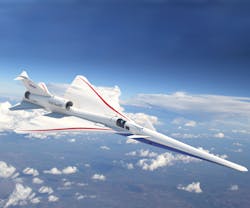Boeing, Northrop Grumman to help NASA develop enabling technologies for near-hypersonic passenger aircraft
CLEVELAND – Space Agency experts are choosing two U.S. prime systems integrators to develop enabling technologies for future near-hypersonic commercial passenger aircraft that travel at speeds of nearly five times the speed of sound.
Officials of the U.S. National Aeronautics and Space Administration (NASA) Glenn Research Center in Cleveland are awarding contracts collective worth $5.1 million to The Boeing Co. and Northrop Grumman Corp. for the High-Speed Endoatmospheric Commercial Vehicle Conceptual Design Study and Technology Roadmaps Development project.
NASA is seeking to develop enabling technologies for high-speed commercial transports able to fly at speeds between Mach 2 and Mach 5 that could enter service as early as the 2030s. Mach 3 to Mach 5 represent speeds between 1,535 and 3,836 miles per hour.
The Boeing Defense, Space & Security segment in St. Louis won a $2.6 million contract, and the Northrop Grumman Aeronautics Systems segment in Palmdale, Calif., won a $2.5 million contract. The contracts were announced on Monday.
These studies will identify key technology needs and opportunities to enable high-speed commercial passenger aircraft. Specific speed, passenger count, range, and allowable technology readiness level has yet to be negotiated.
NASA’s Hypersonic Technology and Commercial Supersonic Technology projects fall under the NASA Advanced Air Vehicles Program, which will lead efforts to develop an environmentally sustainable civilian high-speed aircraft.
For more information contact Boeing Defense, Space & Security online at www.boeing.com/company/about-bds, Northrop Grumman Aeronautics Systems at www.northropgrumman.com/who-we-are/business-sectors/aeronautics-systems, or NASA at www.nasa.gov.
About the Author
John Keller
Editor-in-Chief
John Keller is the Editor-in-Chief, Military & Aerospace Electronics Magazine--provides extensive coverage and analysis of enabling electronics and optoelectronic technologies in military, space and commercial aviation applications. John has been a member of the Military & Aerospace Electronics staff since 1989 and chief editor since 1995.
